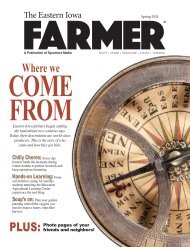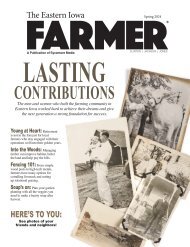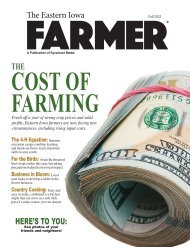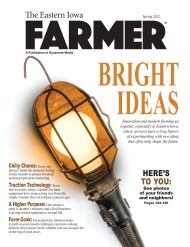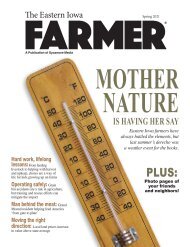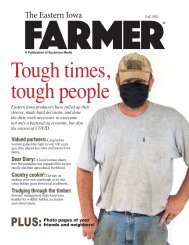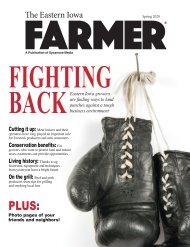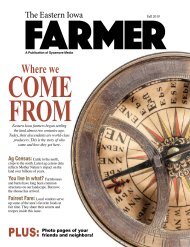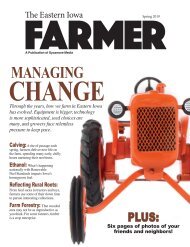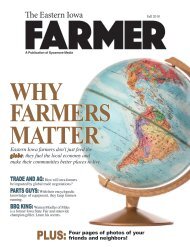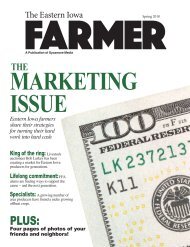Create successful ePaper yourself
Turn your PDF publications into a flip-book with our unique Google optimized e-Paper software.
HUNTING LEASES<br />
whether children under the age<br />
of 18 are allowed to hunt or<br />
accompany adult hunters on<br />
the land. Consider requiring a<br />
hunter to provide proof they<br />
have taken and passed a hunter’s<br />
safety course (even if not<br />
required by state law).<br />
Description of<br />
the Property<br />
Any hunting lease should<br />
specify the exact property<br />
upon which the party to the<br />
contract can hunt. It is advisable<br />
to include legal property<br />
descriptions, as well a map.<br />
The map should clearly identify<br />
nearby inhabited areas<br />
that will inform the hunter<br />
what shot directions should be<br />
avoided. The map should also<br />
mark known hazards, fences<br />
and/or ATV paths.<br />
Terms of Use<br />
The hunting lease should<br />
clearly set forth the specific<br />
terms under which the party<br />
to the contract can hunt. Is<br />
the permission for a particular<br />
animal season only? Is it for<br />
rifle or bow hunting only? Are<br />
there particular firearms that<br />
are not allowed? Does it allow<br />
any legal hunting for a term<br />
of one year? Is it is multi-year<br />
contract? Perhaps a landowner<br />
will want to offer a multi-day<br />
hunting lease to a party or<br />
group. These are all possibilities,<br />
but the document should<br />
specify the exact terms of the<br />
permission granted.<br />
The lease should also specify<br />
if the hunting party is also allowed<br />
to spend the night on the<br />
property or if they must leave<br />
by nightfall. Could the hunters<br />
bring an RV or 5th wheel on<br />
the property to park? If so,<br />
can the party have a bonfire<br />
outside? What is the maximum<br />
number of people who can<br />
sleep there? Can people who<br />
are not part of the hunting<br />
party spend the night? If there<br />
is a small cabin or residence,<br />
the same questions should be<br />
asked, and the lease should<br />
specify what behavior and use<br />
is allowed and not allowed.<br />
Termination<br />
and Options to<br />
Renew Provisions<br />
The contract should specify<br />
the particular grounds and<br />
the manner under which the<br />
landowner can terminate the<br />
contract, including for misuse<br />
or dangerous use of the property.<br />
The clause should state how<br />
the termination notice will be<br />
communicated. The contract<br />
should also specify whether<br />
the contract will automatically<br />
renew or terminate on a particular<br />
date.<br />
Waiver of Liability<br />
As discussed above, liability<br />
should be a prime concern for<br />
landowners contemplating a<br />
hunting lease. Landowners<br />
should acquire a waiver of<br />
liability from the hunters as<br />
part of the lease. Through a<br />
properly drafted waiver, the<br />
landowner should be able to<br />
obtain the same level of liability<br />
protection offered by the<br />
Iowa Recreational Use Statute<br />
as to all adult hunters. Such<br />
a waiver would not provide<br />
protection, however, for children<br />
under 18. Landowners are<br />
advised to seek legal counsel<br />
to draft a legally enforceable<br />
waiver. They are also advised<br />
to discuss any hunting lease in<br />
advance with their insurer to<br />
understand what damages insurance<br />
may cover if an event<br />
were to occur.<br />
Indemnification Clause<br />
Landowners also may want<br />
to include an indemnification<br />
clause. This is when the hunters<br />
agree to assume the risk<br />
and pay any damages caused<br />
to others by the hunter or the<br />
hunter’s activity on the property.<br />
This is important if the<br />
landowner becomes involved<br />
in a lawsuit where a third party<br />
was injured or harmed. It also<br />
can help reinforce the hunters’<br />
responsibilities and encourage<br />
safe hunting practices.<br />
Tree Stands<br />
Studies have found that tree<br />
stands lead to more injuries<br />
than firearms in a hunting<br />
context. Providing a tree stand<br />
or elevated hunting platform<br />
is increasing the risk that the<br />
hunter or guest will become<br />
injured from a fall or improperly<br />
maintained stand. If there<br />
is a tree stand, it needs to meet<br />
the Treestand Manufacturer’s<br />
Association’s safety standards,<br />
and the hunter should<br />
be required to wear a safety<br />
harness at all times. If the<br />
hunter is providing the stand,<br />
the stand should be installed<br />
in summer when it is easier<br />
to identify a dead tree. A dead<br />
tree should never be used to<br />
support an elevated hunting<br />
platform.<br />
Payment Terms<br />
A hunting lease should<br />
include the terms of payment<br />
required under the lease,<br />
including the amount, the due<br />
date, the manner in which<br />
payment is to be made, and<br />
the remedy in the event of<br />
nonpayment. It is best practice<br />
to require payment prior to the<br />
hunting period, usually well in<br />
advance so that an alternative<br />
party can be found if payment<br />
is not made.<br />
As noted above, Iowa hunting<br />
land is a precious commodity.<br />
Through a well-drafted<br />
hunting lease, landowners can<br />
share their resource with others<br />
and, in exchange, receive a<br />
monetary benefit. They should<br />
remember, however, that any<br />
such agreement should be<br />
carefully drafted and cleared<br />
with their insurers. Failing to<br />
take such measures could place<br />
them in a liability landmine. n<br />
About<br />
CALT:<br />
n The Center for<br />
Agricultural Law and<br />
Taxation (CALT)<br />
at Iowa State<br />
University was<br />
created in 2006.<br />
It provides timely,<br />
critically objective<br />
information to<br />
producers,<br />
professionals and<br />
agribusinesses<br />
concerning the<br />
application of<br />
important<br />
developments in<br />
agricultural law and<br />
taxation (federal and<br />
state legal opinions<br />
of relevance, as well<br />
as critical legislative<br />
developments) and<br />
is a primary source<br />
of professional<br />
educational training<br />
in agricultural law<br />
and taxation.<br />
Contact CALT:<br />
Iowa State<br />
University<br />
2321 N. Loop,<br />
Suite 200<br />
Ames, <strong>IA</strong> 50010<br />
Phone:<br />
(515) 294-5217<br />
Fax: (515) 294-0700<br />
www.calt.iastate.edu<br />
eifarmer.com<br />
<strong>Eastern</strong>Iowa<strong>Farmer</strong>_South_Fall2023.indd 73<br />
9/19/23 3:35 PM



